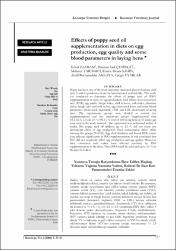Effects of Poppy Seed Oil Supplementation in Diets on Egg Production, Egg Quality and Some Blood Parameters in Laying Hens

Göster/
Erişim
info:eu-repo/semantics/openAccessTarih
2008Yazar
Bayram, İsmailÇetingül, İbrahim Sadi
Yardımcı, Mehmet
Şahin, Emine Hesna
Akkaya, Abdil Burhaneddin
Uyarlar, Cangir
Üst veri
Tüm öğe kaydını gösterÖzet
Poppy has been one of the most important medicinal plant in humans until
now. It and its products can not be manufactured synthetically. This study
was conducted to determine the effects of poppy seed oil (PSO)
supplementation in diets on egg production, feed intake, feed conversion
ratio (FCR), egg quality (shape index, shell tickness, yolk index, albumine
index, haugh units and yolk color), egg cholesterol levels and some blood
parameters (cholesterol, trigliseride, HDL and LDL cholesterol) in laying
hens. The experimental groups were divided as control (no
supplementation) and five treatments groups (supplemented with
0.5,1.0,1.5, 2.0 and 2.5 % PSO ). A total of 240 laying hens at 35 weeks age
were used as the study material. The experiment was performed within 8
weeks. The poppy seed oil addition up to 2.5 % did not cause any
detrimental effect of egg production. Feed consumption didn’t differ
amoung the groups (P>0.05). Egg shell thickness and blood HDL values
were affected significantly by PSO supplementation. It was concluded that
PSO did not negatively affect egg production and egg quality. Moreover
feed conversion ratio values were affected positively by PSO
supplementation to the diets. Thus, PSO could be used and up to 2.5 % in
the layer hen diets. Haşhaş bitkisi ve ondan elde edilen yan ürünleri, sentetik olarak
üretilemediğinden dolayı, insanlık için hala en önemli bitkidir. Bu araştırma,
yumurta tavuğu rasyonlarına ilave edilen haşhaş tohumu yağının (HTY)
yumurta verimi (YV), yem tüketimi, yemden yararlanma oranı (YYO),
yumurta kalitesi parametreleri (şekil indeksi, kabuk kalınlığı, sarı indeksi, ak
indeksi, sarı rengi ve haugh birimi), yumurta kolesterol seviyesi ile bazı kan
parametreleri (kolesterol, trigliserit, HDL ve LDL) üzerine etkilerini
belirlemek amacıyla gerçekleştirilmiştir. Araştırmada HTY ilave edilmeyen
bir kontrol ve % 0.5, 1.0, 1.5, 2.0 ve 2.5 oranlarında HTY ilave edilen 5
adet deneme grubu oluşturulmuştur. Araştırma 8 hafta sürdürülmüştür.
Rasyonlara HTY katılması ile yumurta verimi olumsuz etkilenmemiştir.
HTY yumurta kabuk kalınlığı ve kan HDL değerlerini artırmıştır. Sonuç
olarak, YV ve kalitesine negatif etkileri olmaması ve YYO’nı olumlu yönde
etkilemesinden dolayı HTY’nın yumurta tavuğu rasyonlarında % 2.5
düzeyine kadar kullanılabileceği kanaatine varılmıştır.
Cilt
1Sayı
1Bağlantı
http://hdl.handle.net/11630/2167Koleksiyonlar
- Cilt 1 : Sayı 1 [15]


















